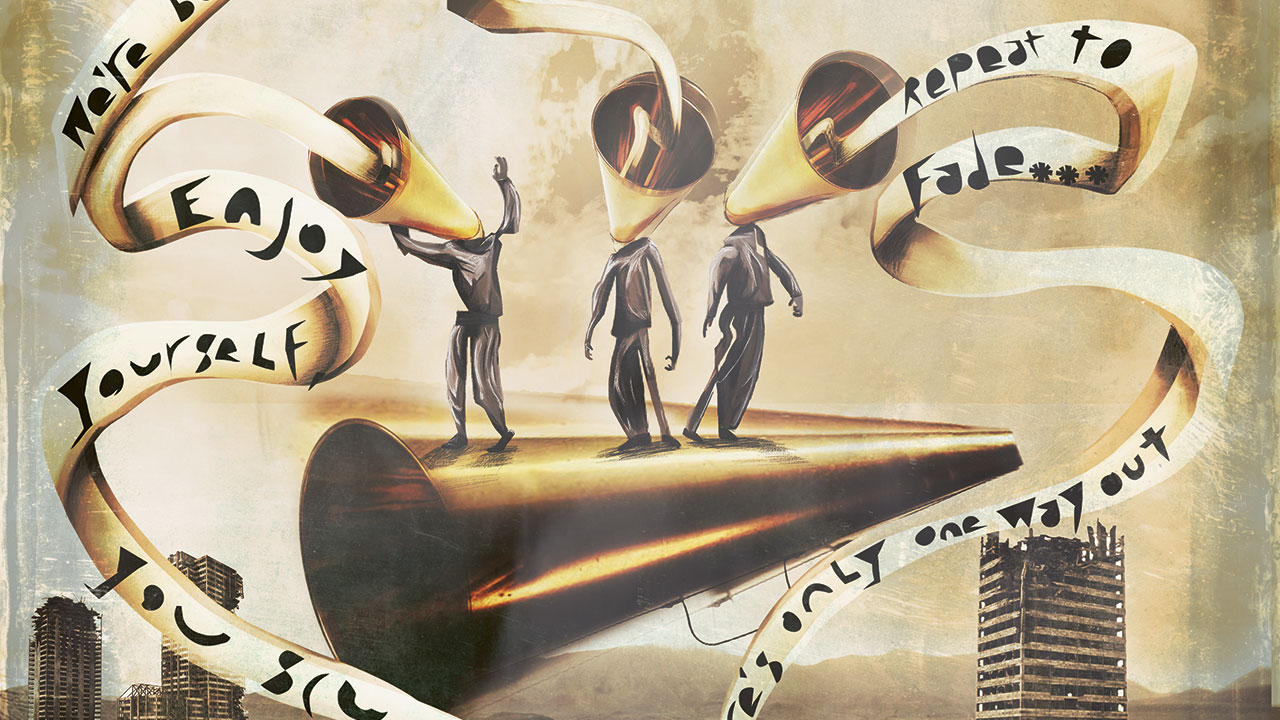As openings go, it’s arresting.
Drop the needle on Frost*’s first studio album for five years and the bewildering voice of a child prompts a double-take: ‘Sit back, relax, and enjoy yourselves… you scum.’
Charming. Yet the blend of toxic positivity and open contempt in that statement sets the tone for a recurring lyrical theme. Keyboard player/co-vocalist/mastermind Jem Godfrey described 2016’s Falling Satellites as his “midlife crisis album”, urging us to live life to the full as our time is limited. Day And Age resembles the work of someone who’s decided positivity only goes so far. Yet rather than representing a grand, over-arching ‘concept’ uniting this record, it’s backed up by a distinctive emotional feel.
Several tracks were recorded in the “bleak, isolated oppression” of a converted coastguard tower, and it shows. Paranoia, bitterness, resignation – they’re all swirling around the lyrical mix: the chorus of the 11-and-a-half-minute title track claims, ‘We’re living in a dyin’ age, where the writing’s on the wall.’
Yet the accompanying sounds are still galvanising, even if it’s anger acting as an energy. ‘We’re burning with a quiet rage,’ sings guitarist John Mitchell, Godfrey’s longtime co-conspirator (vocal and lyric writing duties are split throughout). The former’s six-string arpeggios and the latter’s urgent piano figures echo Duke-era Genesis and even latter-period Police. The track evolves further, across slowly chugging metallic riffs and ghostly angelic voices, before the chorus bursts back in. Soon afterwards, nervy stabs of prog metal jab the gut on Terrestrial and lend edgy anxiety to its AOR-ish vocal melodies as Mitchell laments ‘never knowing what’s out there’.
Yet while those compositions are far from conventionally structured, wilful complication is kept to a relative minimum. The jazz-inflected keyboard freewheeling and frenzied guitar heard on Falling Satellites are less in evidence, and while the celebrated percussion skills of King Crimson’s Pat Mastelotto have been enlisted on Skywards and Repeat To Fade (the band have been officially drummerless since Craig Blundell’s departure in 2019), there’s little indulgence on display here. On occasion, it even feels like they’re deliberately avoiding it: the title track culminates in a promising guitar solo that fades out before it gathers a head of steam. Leaving us wanting more? Mocking prog cliches? Trolling fans begging for a big fat blow-out? Only Jem Godfrey can answer that.
Godfrey has famously made a living from writing pop hits in the past. But while there’s no shortage of progressive tropes on display here, accessible hooks are also plentiful. It feels like an album led by songwriting rather than players or lyrical narratives – and it succeeds handsomely as such. Beautifully wintry undulations of piano underpin Waiting For The Lie, latterly enhanced by cinematic strings, in a real melodic highlight of the record. But again, the lyrical mood is disillusionment. Godfrey intones, ‘these are the games that we play’ as he despairs of modern society’s capacity for mutual deception.
Equally striking – and again offset by dark lyrical clouds – is the yearning opening passage of Kill The Orchestra, which starts with delicate synths accompanying a lament wherein Godfrey warbles, ‘The boy I was has gone and blown his happy brains out.’ Then as the same memorable melodic figures are fleshed out, he croons, ‘I’ll be singing as they string you up.’ Rarely do such ugly sentiments sound as seductive as they do here.
This is certainly not an album light on stylistic adventure, though. The Boy Who Stood Still is a wonderfully odd diversion, employing knotty electro-funk rhythms redolent of Byrne and Eno’s My Life In The Bush Of Ghosts or Talking Heads’ Seen And Not Seen to soundtrack a Radio 4-like voiceover – courtesy of Harry Potter actor Jason Isaacs –recounting the protagonist’s ‘ability to remain perfectly still… he became part of the furniture… invisible’. Fripp-ish guitar angles and fizzing synths add further colour to a track that evokes a short period in music that’s too seldom mined for inspiration – a time when electronica and post-punk adopted prog’s adventurous approach to song structure.
The album concludes with Repeat To Fade’s instruction to ‘stop pouring out your heart, repeat to fade… there’s only one way out, repeat to fade,’ as if Doves had been enlisted to write a cynic’s anthem. Meanwhile, chaos swirls overhead as a soprano twitters operatically and a voice screams ‘enjoy yourself, you scum!’ like the schoolteacher from The Wall meeting Basil Fawlty at the end of the world.
A suitably alarming snapshot of our uncertain times, then, but a thrillingly immersive one at that. You will greatly enjoy yourselves. You scum.

